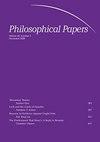霍布斯论科学的幸福
IF 1.3
3区 哲学
0 PHILOSOPHY
引用次数: 0
摘要
许多人认为霍布斯是政治个人主义之父,声称他的新幸福概念涉及放弃其形而上学维度,这在古代和中世纪一直是中心。我强调了先前的评论者对霍布斯思想中科学知识与幸福之间联系的忽视,证明了将他视为建立在个人经验基础上的新的幸福理想的创始人是不准确的。霍布斯采用了一个古老的原则,即人的幸福必然取决于他对一种源于他本性的真理的规范体系的服从。他的独创性在于对人性和科学真理的创新性认识。这篇文章表明,一个人的生命的进步,只有在精神愉悦的领域才有可能,是霍布斯幸福概念的客观因素,这源于他对人类是理性和好奇的生物的定义。离开自然状态使人摆脱了不断的战争和随之而来的暴力死亡的恐怖所造成的痛苦,但并没有使人摆脱对生活目的无知所造成的痛苦。本文章由计算机程序翻译,如有差异,请以英文原文为准。
Hobbes On Scientific Happiness
Abstract Many consider Hobbes the father of political individualism, claiming that his new conception of happiness involved abandoning its metaphysical dimension, which had been central in ancient times and in the Middle Ages. Highlighting previous commentators’ inattention to the link between scientific knowledge and happiness in Hobbes’s thought, I demonstrate the inaccuracy of considering him the founder of a new ideal of happiness grounded in individual experience. Hobbes adopts the ancient principle that man’s happiness is necessarily conditional upon his submission to a normative system derived from the truth regarding his nature. His originality lies in an innovative understanding of human nature and scientific truth. This article suggests that progress in a person’s life, which is possible only in the realm of pleasures of the mind, is an objective element of Hobbes’s notion of happiness, which derives from his definition of humans as rational and curious beings. Leaving the state of nature freed man from the misery that results from constant war and the horror of violent death that accompanied it, but not from the misery whose source is ignorance regarding the purpose of life.
求助全文
通过发布文献求助,成功后即可免费获取论文全文。
去求助
来源期刊

Philosophical Papers
PHILOSOPHY-
CiteScore
2.10
自引率
0.00%
发文量
18
期刊介绍:
Philosophical Papers is an international, generalist journal of philosophy edited in South Africa Original Articles: Articles appearing in regular issues are original, high-quality, and stand-alone, and are written for the general professional philosopher. Submissions are welcome in any area of philosophy and undergo a process of peer review based on initial editor screening and refereeing by (usually) two referees. Special Issues: Topic-based special issues are comprised of both invited and submitted papers selected by guest editors. Recent special issues have included ''Philosophy''s Therapeutic Potential'' (2014, editor Dylan Futter); ''Aging and the Elderly'' (2012, editors Tom Martin and Samantha Vice); ''The Problem of the Criterion'' (2011, editor Mark Nelson); ''Retributive Emotions'' (2010, editor Lucy Allais); ‘Rape and its Meaning/s’ (2009, editor Louise du Toit). Calls for papers for upcoming special issues can be found here. Ideas for future special issues are welcome.
 求助内容:
求助内容: 应助结果提醒方式:
应助结果提醒方式:


